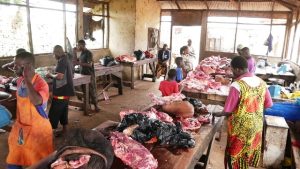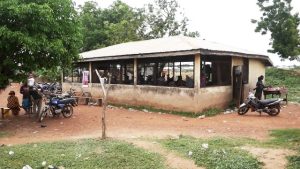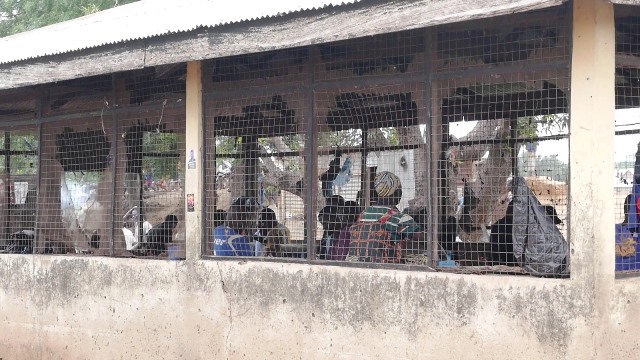Butchers operating at the Buipela Abattoir in Tamale are asking for immediate intervention from the Tamale Metropolitan Assembly to renovate their facility.
The current poor sanitary conditions and ageing infrastructure do not only discourage customers from patronising their services but also present significant health risks to the surrounding community.
Situated adjacent to the main community dam, an essential water source for residents of Buipela and the nearby Zongo community, the abattoir plays a vital role as a meat processing hub. Unfortunately, the facility’s condition has deteriorated markedly over the past decade, primarily due to insufficient maintenance and investment.
Ageing Infrastructure and Unsanitary Conditions
The Buipela abattoir is primarily comprised of temporary stalls that were constructed over a decade ago. Unfortunately, these structures have significantly deteriorated, leading to the protective nets that once safeguarded meat products from pests becoming torn and ineffective. Consequently, swarms of houseflies have begun to contaminate the exposed meat available for sale, thereby raising substantial concerns regarding food safety.
 The butchers operating at the abattoir describe their situation as increasingly challenging, emphasizing that maintaining hygiene standards has become nearly impossible under these conditions. They express concern that the risk of meat contamination not only jeopardizes their livelihoods but also poses a serious health risk to consumers who depend on their products.
The butchers operating at the abattoir describe their situation as increasingly challenging, emphasizing that maintaining hygiene standards has become nearly impossible under these conditions. They express concern that the risk of meat contamination not only jeopardizes their livelihoods but also poses a serious health risk to consumers who depend on their products.
Ibrahim Safianu, the Chief Butcher at Buipela, provided insight into their daily challenges, stating, “Each day, we strive to keep the abattoir clean and safe. However, the presence of broken stalls and numerous flies makes it a continuous struggle. Our greatest fear is that if no action is taken, this situation could lead to outbreaks of disease.”
Additionally, Abdul-Karim Torfiq, another butcher, highlighted the urgent need for improvements: “Customers have begun to avoid the abattoir due to its current condition. It is imperative that we establish a modern and hygienic facility to restore confidence in our offerings.”
Appeals for Support and Funding Challenges
The Buipela Butchers Association, led by Chairman Alhaji Alhassan, has expressed concerns regarding the state of their facilities. They have repeatedly sought assistance from the Tamale Metropolitan Assembly for renovations and improvements, but their requests have consistently met with the same response: a lack of funding.
“We have contacted the assembly multiple times, but we were told there is no money to fix the abattoir. As a result, the facility continues to deteriorate. Flooding during the rainy season disrupts our work and damages the stalls,” stated Alhaji Abdul-Karim Alhassan, the chairman of the association.
 He noted that many butchers have become discouraged and hesitant to pay assembly levies, believing these payments are pointless without visible improvements. Nonetheless, the butchers remain dedicated to their trade. To demonstrate their commitment, they have even started making their own blocks to help build a new facility. “We are not lazy or complacent,” emphasized Alhaji Alhassan.
He noted that many butchers have become discouraged and hesitant to pay assembly levies, believing these payments are pointless without visible improvements. Nonetheless, the butchers remain dedicated to their trade. To demonstrate their commitment, they have even started making their own blocks to help build a new facility. “We are not lazy or complacent,” emphasized Alhaji Alhassan.
“However, we need government support or assistance from organizations to complete the renovations. We cannot do it alone.”
Public Health Implications
Experts highlight the critical importance of abattoir conditions in relation to public health, particularly in areas where meat serves as a primary source of protein. Unsanitary abattoirs can facilitate the proliferation of bacteria and other pathogens, thereby increasing the risk of foodborne illnesses.
The current state of the Buipela abattoir, characterized by issues such as exposure to flies, inadequate drainage, and poor waste disposal, raises significant concerns for both food safety officials and local community members.
A local resident, Fatima Issah, expressed her concerns: “I purchase meat from Buipela due to its affordability; however, I am apprehensive about the presence of flies and dirt. I sincerely hope the authorities will take prompt action to ensure our safety.”
Assembly’s Response and Future Plans
In response to the concerns raised by the butchers, the Tamale Metropolitan Assembly, under the leadership of Mayor Alhaji Abu Takoro, has recognized the validity of their grievances. The assembly is currently in the process of formulating a comprehensive proposal aimed at addressing the challenges faced at the Buipela abattoir, as well as other slaughterhouses within Tamale.
Mayor Takoro stated, “We acknowledge the issues at hand and are diligently working on a renovation plan. However, securing the necessary funding may take time, and we ask for the community’s patience during this process.”
He further assured the community that the assembly is actively exploring potential partnerships and funding opportunities to ensure the successful implementation of these projects.
The circumstances at Buipela highlight the broader challenges faced by numerous abattoirs across Northern Ghana and beyond, where infrastructure often struggles to keep pace with demand and safety standards. Effectively addressing these concerns requires a collaborative effort among local governments, national authorities, and development partners.
For the butchers at Buipela, the renovation of their facility is not solely about enhancing working conditions; it is also vital for safeguarding their livelihoods and ensuring the health and safety of those they serve.
Source: www.KumasiMail.Com/Noah Nash Hoenyefia
































































